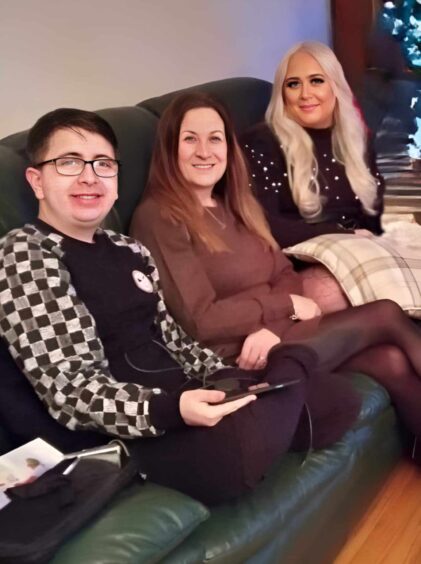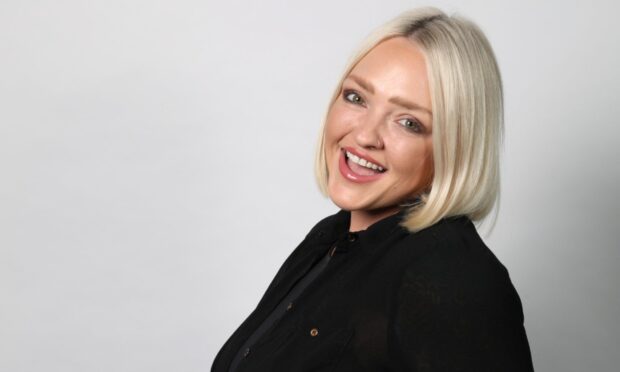
Amanda Brogan proudly shows off a bright teal ribbon she has tattooed on her right wrist.
It is a powerful symbol which marks the 53-year-old’s successful battle with ovarian cancer.
It is also her way of helping to raise awareness of the “silent killer” which claims the lives of 11 women every day in the UK.
“I got the tattoo on August 30 last year – exactly five years to the day since I was diagnosed with ovarian cancer,” Amanda, from Dunfermline, explains.
“It is on my wrist and when people see it they ask: ‘Oh, what is that?’. Or ‘Why haven’t you got a pink one?’
“I then explain that the pink ribbon is the symbol for breast cancer, while the teal one is for ovarian cancer.
“This then starts a conversation.”
When was Amanda diagnosed with ovarian cancer?
Amanda was 46-years-old when she was diagnosed with the disease in August 2017.
She is just one of over 7,000 women who are diagnosed with ovarian cancer each year in the UK.
But it was actually the year before that she started showing symptoms – although she had no idea it was ovarian cancer.
“I had polycystic ovaries which meant I didn’t get periods all the time – maybe twice a year,” she said.
“But in November 2016 I had some really heavy bleeding and I had a feeling something was wrong.
“So I went to the doctor. She examined me and told me she couldn’t see any reason for it. Basically she said there was nothing wrong.
“But I know my own body and I just knew something wasn’t right.
“Two weeks later I was still bleeding so I went back to see another GP – to get a second opinion.”
Within a minutes of examining her, the GP told Amanda she had fibroids.
Fibroids are non-cancerous growths that develop in or around the womb.
Amanda was referred for a scan which she had a few weeks later in January 2017.
The mum-of-two had an ultrasound as well as an internal scan. The results showed she had a cyst on her ovary.
But as there wasn’t any real concern about it, a further scan was arranged for three months time.
After the second scan, Amanda was told the cyst had grown and she was referred to a gynaecologist.
Amanda said: “Any woman who is referred to gynae is also given a blood test called CA125 (this helps to diagnose ovarian cancer).
“If the levels for that are raised it indicates something is going on.
‘I knew oncology meant cancer’
“I got a phone call to say my blood test results had raised levels so I was given a further appointment with the gynaecologist in June.
“At the appointment, they told me there was something suspicious inside the cyst. They then gave me an oncology nurse card.
“I work as a clerical officer at the Victoria Hospital in Kirkcaldy so I knew oncology meant cancer.”
It was decided that Amanda should have a hysterectomy and that the cyst on her ovary would be removed at the same time and sent to the lab to be tested.
At the beginning of August 2017, Amanda had the operation at Victoria Hospital. When she came round from the anaesthetic, she was reassured.
“I asked to speak to the consultant afterwards and he said when they had looked at the cyst it wasn’t suspicious after all,” Amanda continues.
“But he was sending my womb to pathology to check it just in case.”
A few weeks later, Amanda got a phone call at home to inform her the pathology results were not what they had expected.
She was asked to go into the Victoria Hospital the following week.
“I knew then something was wrong,” she recalls.
“So I went in for the appointment with my husband and the consultant told me I had ovarian cancer and womb cancer.
“It wasn’t that the ovarian cancer had spread to my womb – I was told it was two separate cancers.
“We couldn’t take it in.
“Everything then just runs through your mind – I was thinking about my kids and my family. Your life just changes in a second.”
She was referred to the Western General Hospital, in Edinburgh, where she learned she had stage two ovarian cancer and would need to have chemotherapy.
Her chemotherapy treatment started in October 2017 and lasted for six months.
She said: “I was lucky with the chemo treatment I had because it didn’t cause my hair to fall out, it just made it thinner.
“I was ok the first day I had chemo but then for a week afterwards I couldn’t get off the couch.
“I was just so tired. You just have no energy, it floors you.”
Five years after ovarian cancer diagnosis
Amanda’s treatment finished in March 2018 and she continued having regular check-ups and scans for the next few years.
She was finally discharged by her consultant, five years after her ovarian cancer diagnosis, in October last year.
“That last check-up was emotional and it was a relief to know this would be my last regular appointment,” she said.
“But even now there is still that thought of what if it comes back? So I still worry, but I have to also try and be positive.
“I was determined to beat it and I wouldn’t let cancer get the better of me.”
She added: “I am just so thankful it turned out the way it did – especially with the delay in being diagnosed – because it might have been too late.”
Fundraising for ovarian cancer charity
Since her diagnosis, Amanda and her husband Paul, 52, have been fundraising for the charity Target Ovarian Cancer.
They take part in a 10k walk in Edinburgh every year and so far, have raised over £2,600 for the UK charity, which fundraises lifesaving research into the disease.
Amanda has also lost an incredible four stone after joining Weight Watchers in 2019.
Amanda credits the support of her family – husband Paul and two children, Rachel, 27, and Ryan, 23 – for helping her to stay positive throughout her cancer journey.
“It’s hard for family members when you are going through cancer,” she said.
“And it’s difficult for them to see you when you are going through chemo and you can’t get out your bed.
“But my husband, Ryan and Rachel were just so supportive in helping me to get through it – they were amazing.”
Amanda is passionate about raising awareness of ovarian cancer which is known as the silent killer because it is often diagnosed late. She hopes her story might help others.
“The only symptom I had was heavy bleeding.
“And sometimes the symptoms aren’t picked up, which is why ovarian cancer kills so many women.
“I have since read about it and other symptoms of ovarian cancer can include feeling full too quickly after eating, needing to pee more often and bloating, which I think I also had.”
She added: “If someone has these symptoms they should go to the doctor early on to get it checked out because they might not be as lucky as I was.”














